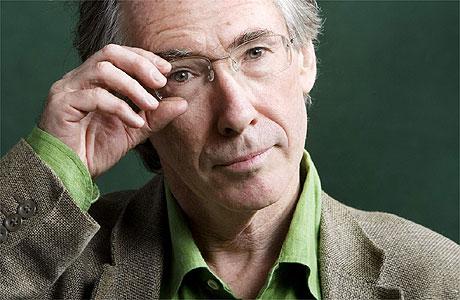Dublin Writer's Festival brings science and literature together

Dublin recently played host to legendary environmentalist Stewart Brand and acclaimed novelist Ian McEwan. Politico was in attendance to hear what two of the most agile intellects of our time believe the global community must do to confront the greatest threat humanity has ever faced: global warming. By Edward O’Hare.
The dialogue between science and literature has a rich history. There were scientists whose way with words was the equal of any poet or creative writer. There have also been writers who constructed their poems and fiction with an almost mathematical degree of precision. The veteran environmentalist Stewart Brand belongs to the first group of thinkers, while Ian McEwan, the Booker-Prize winning novelist, belongs to the latter.
These two men have enjoyed a long friendship and have great respect for each other’s work. The opening event of this year’s Dublin Writer’s Festival brought them together to discuss the greatest problem mankind has ever faced: climate change.
(Picture: Ian McEwan)
Stewart Brand has been an ambassador for the American counterculture movement since the early 1960’s. A Stanford biology graduate, he used rock concerts to encourage people to respect the planet. He even campaigned to have NASA release its now-famous image of the Earth as a tiny, vulnerable sphere of light lost amidst the endless darkness of space in a bid to bring nations together.
In the late 1960’s over 10 million Americans lived in communes and this gave Brand the idea that would immortalize him. The Whole Earth Catalog provided a comprehensive list of all the tools, materials and clothing required to pursue an eco-friendly lifestyle and where these could be obtained. Brand’s new book, Whole Earth Discipline, sees him set out his views about what humanity needs to do to stop global warming.
Ian McEwan has always had a reputation as one of the world’s few ‘serious’ novelists. Books like Enduring Love, Atonement and Saturday have all asked difficult, uncomfortable questions about human nature and our place in the world. Nevertheless, the demanding, intellectual character of McEwan’s novels has not prevented him from gaining one of the largest and most admiring audiences of any novelist alive. Solar, McEwan’s new novel, directly confronts global warming, something he has been vocal about for several years.
The two writers began by comparing the romantic, optimistic world of science with the more pessimistic world of literature. Brand believes that some environmentalists have come dangerously close to seeing the global warming scenario in apocalyptic terms, expecting civilization to “go back to nothing,” a fate we could be said to deserve for our irresponsibility, but he finds this sickening and inaccurate.
Instead, Brand believes environmentalists should take the stance of engineers who see every situation as a problem capable of being solved. “You’re not supposed to be able to fix a tragedy” he says wryly.
McEwan observes that when he set out to be a writer “an intellectual who wasn’t fundamentally a pessimist was accused of being an airhead” but he has come to see his own pessimism as a “luxury of youth.” McEwan explains that, as he has grown older, he has come “to want the human project to succeed".
Both men agree that mankind’s survival depends on making the correct decisions right now, and this involves a complete reconsideration of both political and economic dogma and the opinions of ‘orthodox’ Greens. The failure of the UN climate change conference in Copenhagen was a reminder of just how much work needs to be done.
McEwan argues that what is needed on both sides is scepticism, but it should be directed at oneself rather than one’s opponents. In Solar McEwan’s protagonist, Michael Beard, is an over-the-hill, Nobel Prize-winning physicist who becomes the unlikely head of a programme to reverse climate change. By making Beard an egomaniacal, greedy and despicable character, McEwan is illustrating that even the most obsolete and reactionary figures need to undergo a change of mind if we are going to stop global warming leading to catastrophe.
Brand himself has recently caused great controversy in the Green camp by changing his life-long position on nuclear power and genetically modified food and he advocates these in his latest book. “I went inside their opinion, looked out and saw that it was right. I realised that nuclear power and GM crops are a useful tool.”
Brand believes that if you look at the facts, many of the dominant perceptions about the state of the world prove untrue. For example, much of the planet is experiencing not a population explosion but a population implosion. Increased immigration, education and urbanisation have taken effect, rates of childbirth are falling, and societies are getting steadily older.
Brand explains that because population density has gone down so considerably even hardened environmentalists are saying that the developed world needs to return to the days of the 2.1 children family. Otherwise, the ever-increasingly average age of the populations of London, Paris and New York will mean that these cities will lose their towering positions on the world stage. Brand believes that unless there is a major shift, all of the great Western capitals will, in the end, be superseded by the likes of Lagos, Sao Paulo and Mumbai.
On the other hand, McEwan comments that humanity “has a poor record” when it comes to futurology. “No-one predicted the internet or mobile phones. If the predictions of the 1950’s were right we’d all be wearing Dan Dare suits and have personal helicopters,” he laughs.
As a child McEwan would try to imagine the worst possible things that might transpire, because if the future is never what we can predict, by predicting enough nightmare scenarios what actually happens might turn out to be something much better.
Let us hope that he is right.
